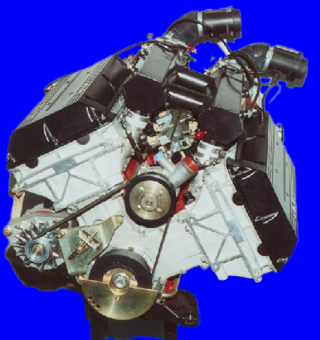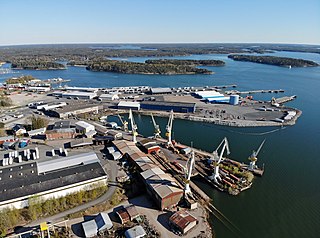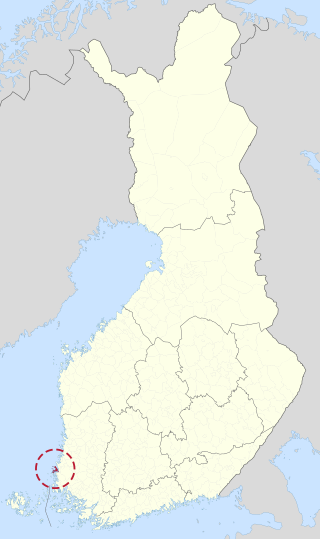Valmet Oyj, a Finnish company, is a developer and supplier of process technologies, automation systems and services for the pulp, paper, energy industries. Flow control serves a wider base of process industries.

The Saab 900 is a mid-sized automobile produced by Swedish manufacturer Saab from 1978 until 1998 in two generations: the first from 1978 to 1994, and the second from 1994 to 1998.

The Saab 9-3 is a compact executive car initially developed and manufactured by the Swedish automaker Saab.

The Saab 90 is a family car produced by Saab from September 1984 to 1987. It was manufactured at a facility in Uusikaupunki (Nystad), Finland, at that time owned by a joint venture with Finnish Valmet called Saab-Valmet. The 90 was a continuation of the Saab 99, and it was basically a Saab 99 from the B-pillar forward with the rear of a Saab 900 sedan. The 90, while easier to build than the 99, was still considerably more labour-intensive than the more modern 900.

The Saab 99 is a car produced by Swedish manufacturer Saab from 1968 to 1984; their first foray into a larger class than the Saab 96. While considered a large family car in Scandinavia, it was marketed as a niche compact executive car in most other markets. It was manufactured both in Sweden and Finland and was succeeded by the Saab 900, although the 99 continued to be produced alongside its successor. The Saab 90, an updated, less complex version using many 900 parts took over from the 99 in late 1984.

Saab Automobile AB was a car manufacturer that was founded in Sweden in 1945 when its parent company, Saab AB, began a project to design a small automobile. The first production model, the Saab 92, was launched in 1949. In 1968 the parent company merged with Scania-Vabis, and ten years later the Saab 900 was launched, in time becoming Saab's best-selling model. In the mid-1980s the new Saab 9000 model also appeared.

Uusikaupunki is a town and municipality of Finland. It is located in the Southwest Finland region, 71 kilometres (44 mi) northwest of Turku and 97 kilometres (60 mi) south of Pori. The municipality has a population of 14,887 and covers an area of 551.65 square kilometres (212.99 sq mi) of which 49.04 km2 (18.93 sq mi) is inland water. The population density is 29.58 inhabitants per square kilometre (76.6/sq mi).

The Simca 1307 is a large family car produced by Chrysler Europe and subsequently PSA Peugeot Citroën from 1975 to 1986. Codenamed 'C6' in development, the car was styled in the United Kingdom by Roy Axe and his team at Whitley, and the car was engineered by Simca at Poissy in France.

The Saab B engine is an inline four-cylinder car petrol engine developed by Saab Automobile. A redesign of the Triumph slant-four engine, the B engine displaced 2.0 L and first appeared in 1972. The B engine was used in the Saab 99 and 900 models. Saab began to phase the engine out in 1981.

The Saab V8 is a V8 engine developed for Saab Automobile by Saab-Valmet. Only five prototype engines were built, with one being extensively road tested. The V8 engine was never put into production.

Valmet Automotive is a Finnish vehicle contract manufacturer and supplier of battery, roof, and kinematic systems.

Fisker Automotive was an American automobile company. It produced the Fisker Karma, which was one of the world's first production luxury plug-in hybrid electric vehicles. The company was founded in 2007 by Henrik Fisker, a Danish automobile designer.

Korvensuu was the name of a car constructed in Finland by Frans Lindström, owner of a small machine factory. The car was not intended for production, but rather as an example of his company’s abilities. Design and construction was done during the years 1912-1913. Most of the car parts were locally built. The engine is a 10hp air-cooled four-stroke inline 2-cylinder. The exhaust valves are side-valves and inlet valves are of atmospheric type, not connected to camshaft.

Beijing Automotive Group Co., Ltd. is a Chinese state-owned automobile manufacturer headquartered in Shunyi, Beijing. Founded in 1958, it is the sixth largest automobile manufacturer in China, with 1.723 million sales in 2021.
The Marussia B-Series was a series of sports cars built by Russian automaker Marussia Motors. The series consists of the B1 and the B2; the cars are technically similar but are very different in design. The two vehicles had the same engines, layout, features, suspension, and brakes. Priced at over 4,000,000 ruble, they were the first Russian supercars ever built. It featured a full carbon fiber car with aluminium chassis. About 3,500 units were planned to be built.
NEVS AB was a Swedish electric car manufacturer which acquired the assets of Saab Automobile from a bankruptcy estate in 2012. After facing numerous financial difficulties, the company was closed in March 2023, with both Polestar and EV Electra interested in buying the former Trollhättan factory.

The Finnish Museum of Car and Road Mobilia is the national museum responsible for its special field, roads, and road traffic. The museum is situated by lake Längelmävesi in Kangasala, Finland, about half an hour drive from the city of Tampere. The museum is open to visitors all year around. There is also a cafeteria, a museum shop and playground and beach facilities for children.

The Port of Uusikaupunki is a mixed-use cargo port located in the city of Uusikaupunki, in southwestern Finland, on the eastern shore of the Bothnian Sea.

Pyhämaa is a village and a former municipality of Finland in the former Turku and Pori Province, now in the Finland Proper region. It was consolidated with the town of Uusikaupunki in 1974.


















